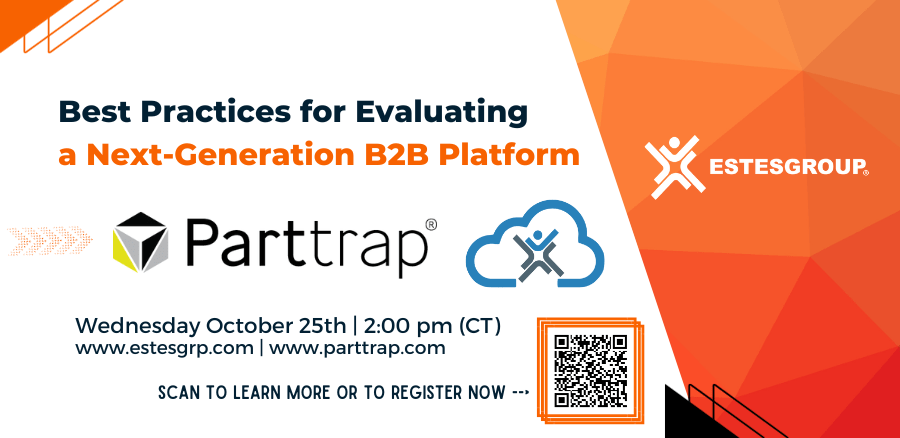
Connecting the Clouds: Website vs. ERP Hosting
Manufacturers and distributors can benefit significantly from a Managed Services Provider (MSP) managing one website or kin websites as part of an integrated IT services, IT security, and enterprise cloud strategy. An external IT provider ensures that the world will view web-based company representation with optimal performance, scalability, and security, reduced downtime and enhanced user experience. Through robust IT security measures, a cloud provider like EstesGroup safeguards sensitive data, mitigating the risk of cyber threats. Additionally, integrating enterprise cloud solutions facilitates seamless data access, collaboration, and scalability, enabling manufacturers and distributors to focus on core business functions while staying agile and competitive in the digital landscape.

For businesses, websites serve as crucial repositories for sharing information, necessitating proper hosting and data management to connect with customers, ensure security, and facilitate growth. When exploring website hosting services and ERP hosting solutions, businesses encounter various cloud options, with managed hosting and shared hosting being the primary types. Understanding the distinctions in the website vs. ERP hosting conversation empowers businesses to make informed decisions aligning with their unique identities.
Is your website hosting forgotten data?
While your IT team is focusing on critical tasks, your website might go unnoticed, opening the path to vulnerability and chaos. In the realm of website hosting, discerning between managed hosting and shared hosting is essential. Managed hosting is ideal for businesses seeking comprehensive control and responsibility, with the service provider acting as a dedicated IT department overseeing all aspects of the website. Conversely, shared hosting accommodates businesses needing performance and security but may lack the size or budget for full-service management. Multiple businesses share resources like RAM and CPU under a shared server, potentially impacting performance during traffic surges. Managed hosting suits larger enterprises prioritizing ultimate performance and security, while shared hosting remains viable for budget-conscious smaller businesses.
Managed Hosting vs. Shared Hosting vs. Managed ERP Hosting
Businesses should consider several key differences between managed and shared hosting for websites and ERP hosting for enterprise resource planning applications. Here are a few things to keep in mind as you unravel your web of business data.
- Resources: Managed hosting provides dedicated server resources, ensuring optimal performance, while shared hosting involves resource-sharing, potentially leading to performance issues during high traffic.
- Customization: Managed hosting offers customized solutions, tailored to specific business needs, whereas shared hosting tends to be more one-size-fits-all.
- Security: Managed hosting prioritizes security, protecting individual businesses, whereas shared hosting may compromise security if one business on the shared server experiences a breach.
- Optimal Performance: Managed hosting eliminates performance issues associated with shared resources, providing consistent and optimized performance.
- Updates: Managed hosting ensures prompt updates and security patches, while shared hosting may require businesses to schedule updates themselves.
- Email: Both hosting types offer email services, with managed hosting providing premium plans for enhanced features.
- Cost: Shared hosting is more affordable, making it suitable for smaller businesses with budget constraints, while managed hosting, though more expensive, offers superior performance and security.
How ERP Hosting Gets Tangled in Your Website Web
The discussion on website hosting parallels ERP hosting, where businesses can opt for a managed service provider to host their ERP software in a remote, cloud-based data center. This centralized approach provides cost-effective, secure, and scalable solutions, enabling businesses to focus on operations rather than maintaining on-premise infrastructure.
Businesses must comprehend the disparities between the many available cloud options to make informed choices for their website and ERP hosting needs. While managed hosting excels in performance, security, and support, startups or small businesses with budget constraints may consider shared hosting initially. Managed hosting proves invaluable for businesses seeking to eliminate on-premise responsibilities, allowing them to concentrate on optimization and growth.
Complex Cloud Hosting Environments
Experience seamless business operations with our fully managed ERP hosting, ensuring optimal performance, security, and scalability as we take charge of your ERP software in a secure, remote, and cloud-based environment. Ready to tackle website vs. ERP hosting? Elevate your online presence with our fully managed website hosting, where a dedicated IT team handles every aspect, providing tailored solutions for peak performance, robust security, and unmatched support. Trust EstesGroup to streamline your technology infrastructure, allowing you to focus on growth and innovation without the burden of managing complex hosting environments.











